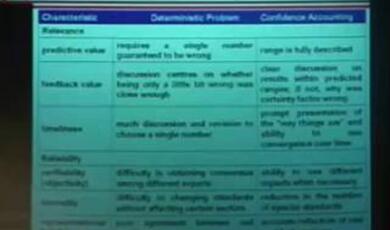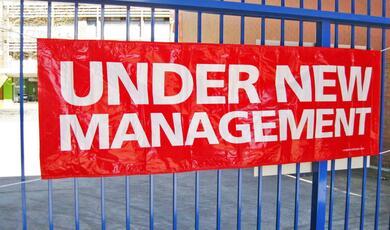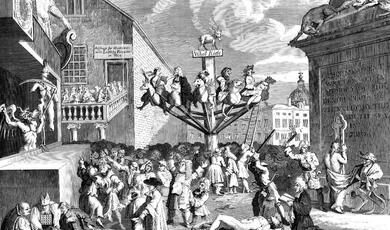Ghost of Scandals Present: Modern Pitfalls
Share
- Details
- Transcript
- Audio
- Downloads
- Extra Reading
The litany of great financial scandals is long, and sadly unending. Dickens himself covers scandals we would recognise today in Little Dorrit and Nicholas Nickleby. Beyond Dickens, the South Sea Bubble (of course), railway shares, bonds in newly independent countries (Kingdom of Poyais), never again... IOS, Saavundra, Rolls Razor, Bank of Gibraltar, BCCI, never again... endowment mortgages, Barlow Clowes, Equitable Life, Maxwell, Lloyd's names, Lehman Brothers, payment protection insurance, never again... This symposium seeks, through the ghosts of scandals past, present and future, to see what lessons we can learn and to assess which is rosier, the future of finance or of financial scandals.
Download Transcript
10 January 2013 Ghosts of Scandals Present: Modern Pitfalls Professor Mike Jones My talk is going to dovetail into what we have just heard, from a slightly different perspective. I am an accountant, and what I am going to do is tell you a little bit about a book that was a long time in the making, and I will also tell you a little bit of the background of that. Effectively, I have spent a long time being an accountant – for those people who are not accountants, then they probably think that, for an accountant, two and two makes four, and they do not appreciate the fact that the older joke is, when you ask an accountant, “What is two and two?” and the accountant says, “What would you like it to be?” So, when you start going under the surface, then things are not as straightforward as most people would think. Accounting is all about judgement, and in judgement then, it means that there is creativity, and whereas in most fields creativity is a good thing, in accounting, it is generally perceived to not be such a good thing. So my lifetime’s work has been investigating this borderline between creative accounting and fraud. So what is the difference? Well, to be honest, it is only a fraud when a judge says it is a fraud. Until that point in time, it is creative accounting. I will be going through and I will show you that the penalties are not so great. I would take issue a little bit with the first talk in which Edward said that basically frauds were quite complex. I would agree, there are a set that are very complex, but also there is a set that are incredibly easy, that you would have thought a five year old could pick up but some of the auditors obviously did not. This book, which I wrote, “Creative Accounting, Fraud and International Account Scandals”, Michael kindly put a flyer on your chairs. It is by Wiley’s. For some reason, and I have no idea, he has got a very old flyer which has me down as Cardiff Business School. I am now at the University of Bristol, so I do not know quite how long ago that was done. Basically, I thought let us see if I can get together a group of colleagues who will give us a global perspective on accounting scandals. No book like this has ever been done before and now I know why – because the book was held up for a year after a legal read because in the UK, we are apparently the libel capital of the world, and the lawyer came up with 37 pages of comments on this book. I said to Wiley’s, I am not going any further with it unless I get a personal indemnity. They said we are not going to give you a personal indemnity, but we will give you an insurance contract. We negotiated for a year on the insurance contract, and then their New York office intervened and said we are not giving him an insurance contract but we will give him a personal indemnity, but we will not give the individual authors of the individual chapters personal indemnity…! So then I had to act as an in-house lawyer – it was a terrible process to get through! But, hopefully, it is a rich source of what goes on, and like an echo, complete the story of the past scandals. They have happened throughout history, I will not go into the historical element too much, but one of the chapters looks at the history of scandals and you will see that it goes back to the oldest one I know which is a scandal in Mesopotamia. But they have always happened, and I suspect that human nature means they will always happen. I once sat in the garden for an afternoon – it was one of the most enjoyable afternoons I have had as an academic, thinking up cartoons for a book that I was writing. This sums up, if you like, my feeling about accountants, that they are, as I said before, creative, and therefore it should not surprise anybody that accounting, as a discipline, is full of creative accounting and full of frauds. I gave a talk about a year ago to a group of management accountants in Bristol, members of CIMA, the Chartered Institute of Management Accountants, and what happened was I said to them during the talk, “Okay, can you give me an honest answer here: who has used creative accounting in your career?” Every hand went up. I talked to a Professor of Management Accounting in Bristol who was worried about his son – he said, “He is too honest! He says that he will never use creative accounting!” He said, “I think that is going to be a real problem for him in his career.” The last little thing, from an introduction, I will say is that I used to have a colleague/friend who lived quite close to me, he was called Mike, and I saw him one day, and he was a management accountant and he worked in the Valleys in Cardiff. I looked really fed up, and I said, “What is the matter, Mike?” He said, “Oh, work,” he said, “It is the quarter’s end and I have got to put the results up to Head Office.” He said, “It is a real bugger.” He said, “They have told me that they want half a million pounds’ profit.” I said, “Yeah, so what is the problem?” He said, “I have only got 350,000,” he said. He said, “So that means that I have got to spend the whole weekend going and counting all the stock that I would not normally count to get it up to half a million,” and he said, “Sonya is furious – it is her birthday over the weekend and I promised to take her out!” But, again, we are talking about the creativity that underpins accounting. I will contrast creative accounting with what accounts are supposed to do. What accountants are supposed to do is give a true and fair view of accounting. A true and fair view. But that implies that there has to be flexibility and there has to be judgement. For example, if you had a fleet of lorries and you were using them up over five years, you would expect to depreciate them over five years, but if a similar company had a fleet of lorries and used them over ten years, then you would expect to use them up over ten years. So, inherent in that judgement, we have lots of different scenarios, and you have got true and fair, you have got creative accounting, you have got impression management, and you have got fraud. Fraud, I would define as stepping outside the regulatory framework deliberately to give a false picture of the accounts, but it has to step outside the regulatory framework, and it is not very easy to tell when somebody is stepping outside the regulatory framework because the whole point about the regulatory framework is that it is set there to deliver a true and fair view and therefore it is deliberately flexible, and in that flexibility, as I said, there is the potential for creative accounting and potential for fraud. If we look at the range of possibilities why this happens, a lot of it is just personal incentives. There are great incentives in a capitalist system to make money out of bonuses, shares, share options, and to do that, you have to deliver a certain amount of profit, and to do that, you need to look at the accounting that goes behind that. Many of the problems actually stem from the way that the capitalist system works and the way that analysts predict what future earnings will be. Companies do not like reporting under what analysts predict because it often has a negative effect upon their share price, and so lots and lots of empirical studies have shown that accounts are manipulated to deliver what the analysts expect them to deliver. So, if you look statistically at it, there are very, very few cases of small losses, but there are many, many cases of small profits. If you are going to go for a loss, go for a big loss and get it all out of the way, and then you can get your profits back on track. One of the most common things that you find - and it’= is human nature, is it not? – we had a change of Government recently, the Government came in and said, ah, we knew the situation was bad but we did not know it was this bad, and now we have seen how bad it is, we have got to do this, this and this. I am not trying to make a political judgement here. I am not saying that they would necessarily have not done this, but perhaps they would not have done. Perhaps they are using it as a cover for doing what they would have done anyway. Similarly, if you get companies coming in, new changes of ownerships, they can often say, oh, yeah, well, we knew the firm was not doing too well, but we did not know it was doing this badly. It is called “big bath”, you dump everything down, you reduce stock down, you reduce debtors down, and then that feeds through in subsequent years because when you sell the stock, when you sell the debtors, so when the debtors are realised, then you make more profit because you have written them down as a “big bath”. Underlying this is lots of different things – new management team there… Essentially, you can divide creating accounting, and remember, creative accounting blends into fraud, into four areas: increase income, decrease expenses, increase assets, decrease liabilities. A lot of these are very easy things to do. As I said, the simplest way to increase your profits, in any one year, is just to increase stock because stock is value, and every million pound that you increase your stock, you increase your profits by a million. It is as simple as that. There are lots of complexities, but there are also lots of simple things. Some of these have already been mentioned and I am obviously not going to go through them but I think he mentioned things like railway scandals. Did not mention City of Glasgow Bank, but yeah, there we are, the banking theme again! In that particular case, there was unlimited liability, so you can imagine what damage that caused to the bank holders in Scotland! The earliest one that I have come across, and if anybody has got any older ones that is fine, is the Cruciform Monument in Mesopotamia, second millennium BC. Archaeologists, I believe, think that the inscription upon a monument was altered to increase it, so it basically said something like – I will use today’s money – “Every year, the king shall pay ten million pounds to the temples.” They think that it was probably one million pounds and that they had enhanced it for their own purposes. But these scandals go through. My focus is on scandals, in this book, from about 1980, and I contacted my accounting network and I wrote to people in different countries, and basically everybody wrote back to me and said, yes, we would love to write a chapter. I was a bit worried that they would not want to write a chapter or there would not be any scandals, and they always said, “And which scandals would you like us to write about in our country?!” The only people who were not keen to join in were the Americans, because, from the American academic perspective, it does not add much street cred if you get a chapter published in a book that is published in the UK. The French guy – and it was a bit annoying to find that one of the reviews of the book kept going on about how there ought to have been a chapter on France…well, there should have been, but he did not deliver. He was the only one who did not deliver and they all varied in their approach. The Dutch guy was so uptight about the chapter that he wanted to withdraw from the book when we had these legal problems. The Indian guy was totally relaxed about it that we almost had to axe the chapter until there was a lovely scandal in which Satyam confessed on television, which saved the Indian scandal. But he was just writing on the rogue trader, but the guy had never actually gone to court because, in India, you do not actually go to court! It has been 25 years and you are still waiting to go to court. The German guy kept saying, well, we can write whatever we want in Germany. We said, “You ca not in the UK.” But he could not quite get that concept. Basically, we got loads of cases there. Picking up from what was set earlier, by Edward again, the two countries with the most frauds that we found are China and the US. Now, you can speculate why they are, and I would, you know, concur that that is still likely to, going forward, to happen. The reason, quite simply, from my understanding of it, is that the incentives are just so great in the US. They do have punitive legislation, but you can make so much money in the States that the incentives are there. In China, because they are going down the market road, everything is going quite quickly, they have got very little regulation, everything’s coming up, then that is why there is so much in China, because it is developing so fast. Those are the authors and countries. These are just six scandals that I picked out as illustrative. What is quite interesting is that we named, or we went into depth with 54 scandals, we know of about 200 scandals, I think listed at the back of the book, and originally, we had maybe 300 but the lawyers came in and told us to take that one out, this one out, or whatever, so we had to trim them down. Everybody tends to have heard of Worldcom and Enron because it is out there. Most people in Europe tends to have heard of Parmalat, but a lot of these other cases, you will not find many people at all have heard of them, but in their own way, they are as important in their own countries as these scandals I just mentioned…Enron is for the US. In Australia, for example, HIH, which was the second largest insurance company, collapsed in 2001. Insurance companies, like banks, appear to have a lot of trouble avoiding scandals. In this particular case, they did things like a side-letter. A side-letter is a lovely thing because what they did was they said, in their accounts, that we have transferred all liability to this scandal, I do not know, let us say to Australian Mutual. Australian Mutual wrote a letter back to them saying we disagree with this interpretation. So, what they do is, the file they showed the auditors has this, that we have devolved all liability to Australian Mutual and they have agreed to bear any losses. That is on file, but what they do not have is the letter back from Australian Mutual where it says, well we disagree with this interpretation – we will not bear all losses. So you have asymmetric disclosure, and that is often at the root of scandals. One that I am very fond of is the Bank of Crete. There was a guy called Koskotas, he went over to the US and apparently learnt his trade as a forger over in the US, and he came back and he started working in the Bank of Crete, and he stole $1.5 million. He just transferred it to his uncle’s account in the NatWest Bank in London. Nobody seemed to notice! So, he did it again, and it was a complete failure of internal control. Overall, I think, it is alleged because they have not actually got the figure, that he embezzled 32 million dollars. But the methods that he used were really simple – there was some complicated stuff in there, but, you know, a lot of it was not rocket science. Okay, now, I will just pick up some themes in the last five minutes. First of all, I would agree totally with this idea that you have got charismatic persuaders, some would say conmen, but basically, the people who usually are leading the companies that are doing these massive frauds are charming. They are the kind of people that you want to go out to dinner with – you know, they just really are great people, and they can convince the birds off the trees. Mario Conde at Banesto, there was a lovely quote about him being a womaniser, a dabbler in the occult – it was in the Economist. We could not use it in the book because, in the Economist, they could write an apology in the next issue, but we could not write an apology in the book. So there are managerial motivations. A lot of it is covering up bad performance. What we never know is how many people got away with this. Because you have heard – it is just like gambling, is it not? You go in, you lose a bit of money on the horse, you put more money on the horse… Well, sometimes it works, and so a lot of people – a case in Japan, they actually said to the judge, yes, we came in, we found that the company was practically bankrupt, we did this because if we had gone bankrupt, then thousands upon thousands of people would have lost their money from the shares – we thought we could turn it round, we are sorry, we were wrong. But what would you do if you were faced with that situation? One thing I would echo, which is what Edward said, is what happens, a major scandal, politicians rush round like mad things, they produce new regulations… A very wise professor once said that, “It takes four years to right scandals; it takes an intelligent accountant or merchant banker 30 minutes to find a loophole.” And there is a theoretical model to reduce creative accounting and fraud… One thing that I would say is the penalties are remarkably light. If you actually analyse – I think we had data from 30 or 40 cases, even where there were major scandals that wrecked thousands of people’s lives, you had the situation whereby somebody got eight years’ jail sentence. I think I probably could count on the fingers of one hand the people who got sent to jail for more than ten years – Enron was one example, and so the Americans are quite tough. But, generally, they receive very, trivial sentences. So, overall, I would echo Edward that basically we are never going to avoid creative accounting, we are never going to avoid frauds. We can keep our eyes open, and I think it was just a very interesting thing, there will always be bubbles and there will always be scandals – I keep waiting for Jeremy Paxman to sit in front of a Vice-Chancellor in four years’ time and say “But was it not obvious that one day the Chinese students would stop coming over here and therefore, you know, 25% of UK universities would go automatically bankrupt – but was it not obvious?!” You know, is it not an accident waiting to happen? So, wherever it is, whether it is in accounting, education, there are these bubbles, and all we can do is to keep our eyes open. © Mike Jones 2013
This event was on Thu, 10 Jan 2013
Support Gresham
Gresham College has offered an outstanding education to the public free of charge for over 400 years. Today, Gresham plays an important role in fostering a love of learning and a greater understanding of ourselves and the world around us. Your donation will help to widen our reach and to broaden our audience, allowing more people to benefit from a high-quality education from some of the brightest minds.


 Login
Login







